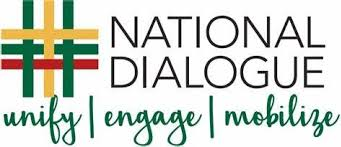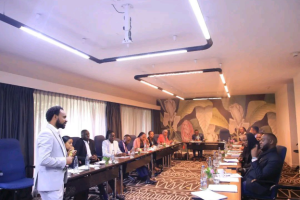
Countries of the world have been devising possible local mechanisms to resolve the problems from which they have been suffering via establishing dialog commissions.
It is also well recognized that national dialogue is a political process that is made and owned nationally to generate consensus among a broad range of national stakeholders when there happen deep political crisis in a given country and when the needs come to manage post-war situations or far-reaching political transitions.
It can reflect an official negotiations forums which are typically convened to address far reaching national concerns which are often long-standing root causes of violent conflicts that political protest or armed insurrection have brought to the forefront. Such dialogues can transform a given country from a dictatorship system where war is possible to democratic system where peace prevails as liberalists argue that democracy avoid conflicts and promote cooperation.
National Dialogue, therefore, can be a forum to ease tensions, manage political crisis and deadlock, reach political agreement and reestablish a new institutional framework, and transit from civil war. In other words, national dialogue is made for broad-based change processes like negotiating a new social contract or narrower objectives.
If they had under gone all-encompassing and honest dialogue among themselves, there would have been a chance to curb the civil war and the disintegration they went through. Seemingly taking a lesson, Ethiopia, too, is on the process of national dialogue. This national dialogue is thought to solve the political crisis and keep the integrity of the country by paving the way for national consensus of the citizens, mainly interest groups.
The very thing that needs to be taken into account is it does not mean that all countries which have conducted national dialogue can succeed; some countries have solved their political problems through national dialogues, but others did not. For example, Tunisia has undergone national dialogue and solved its political crisis in 2013 and saved the country from collapse. Sudan, on the contrary, had held national dialogue from 2014–2016 and failed because there was intervention. This means that there are situations where national dialogues are successful or futile. There are pre-dialogue, during dialogue and post-dialogue factors which contribute for the success or failure of national dialogues. The pre-dialogue and during dialogue factors are related to the general principles of national dialogues whereas post dialogues are related to implementations of the agreed upon points.
The key national dialogue principles which must be contextualized are inclusion; transparency and public participation; credible and neutral convener; clear mandate and appropriately tailored structure, rules, and procedures.
It is repeatedly said that Ethiopia’s national dialogue is on the right way as it has followed right procedures. The National Dialogue Commission alongside Ethiopian partners comprising the national, regional and even international bodies has been working hard to make all citizens, basically selected representatives, the Diaspora community, too, well aware of the significance of very essence of the National Dialogue.
Commission’s engagements have contributed a lot to opening a wider conversation on the Ethiopian transition process and fostering the idea of political talks in a manner full of civility. Incontrovertibly, building an enabling environment via collaborating with partners is of significantly useful in running broad-based, Ethiopian-owned and driven National Dialogue process, as well as parallel side tracks linked to this national venture.
As National Dialogue and constitution-making processes are increasingly part of political settlements, Ethiopians need to amend it if doing so would get the roots of all turmoil and chaos dried for good. The purpose of the National Dialogue Commission is guiding for comprehensively designed and implemented conversation. True, such an appealing move helps improve inclusive national close talks and enhance the capacities and contributions of divergent parties and even external actors towards their successful execution.
The importance of maintaining good contact with citizens and developing ways in which they can participate is usually recognized in large, inclusive and participatory dialogues. It is in this way that ensuring peace and creating a peaceful country can be absolutely possible. In both constitution making processes and political dialogues, increased openness and inclusiveness in even wider conversations may lead to more durable outcomes.
The Ethiopian Civil Society Organizations Council (ECSOC) is also scaling up the pace to help civil societies play a constructive role in the upcoming national dialogue. Various measures have been taken for a successful national dialogue to take place in a manner it said to be ‘all-inclusive, convenient and knowledge-based. This is really a promising step, indeed!
As promoting the exchange of information and experiences on the commission’s main policies and initiatives, as well as on-going institutional reforms in the country, the dialogue would come to the forefront, of course. It is believed that coordination of many activities will greatly enhance the effectiveness, relevance and impact of the engagement and contribute to the realization of the overall objectives of the commission.
The national dialogues would be instrumental in bringing together all relevant national stakeholders and actors based on a broad mandate to foster nation-wide consensus with respect to key conflict issues.
The National Dialogue has, thus, gained considerable importance as a platform for peaceful transformation. It further reflects the belief that conflict resolution processes must be as inclusive as possible, involving a broad range of political actors and extending beyond a limited set of political players to include society at large.
It is really a nationally owned political processes aiming at establishing agreement among a broad variety of national stakeholders in times of significant political crisis and during major political transitions. Likewise, National Dialogue fosters ownership within new political, economic, and social systems, intending to establish new institutions and negotiate a new or revised social compact between the state and its population. Developing socio-political procedures that may serve as containers for peacefully resolving these issues is critical, and serves as the experience foundation for further institutional transformation and nation-building.
It should be noted that the inspirations for participating in a national dialogue differ and rely vigorously upon whether the exchange is pointed toward advancing grasping, changing the personalities and interests of partners, or essentially pointing towards keeping away from heightening and falling back on savagery.
Thus, Ethiopia will survive if leaders and elites unite to forge a new countrywide consensus and build a new political order that guarantees the honor, coexistence, and solidarity of the people. To this end, the country is on the verge of an inclusive national dialogue procedure in which all stakeholders can come together and speak about vital national troubles to attain a common and lasting political answer.
True, the process could allow rival ideologies and communities in Ethiopia to redefine their relationships and promote higher expertise on the troubles that divide and polarize. A national dialogue ought to help bridge the rift between different actors and foster a culture of communication and collaboration, and agree. Ethiopian domestic politics has been producing consistent violence and anxiety for years due to political reforms and demands for a negotiated political solution have been rejected for many years. Now it is time to adders all these irregularities.
Principally, as national dialogue is an opportunity to settle accounts with the ghosts of the beyond and renegotiate destiny, it will not be without challenges. Hence, the government needs to device possible solutions to the many problems and multifaceted defies rampant in the country.
In a nutshell, the role of all citizens, concerned bodies, and civil society organizations is untold in making the national dialog fruitful. This incomparable role can be accompanied with a playground that can potentially provide all citizens with ample opportunities to express ideas and feelings to be a feasible input for meaning.
Close talks, wider public discussions, and even national dialogue can be regarded as playgrounds to do so. Since the national dialogue cannot be successful if it does not facilitate and give adequate opportunity for the public to be informed and participate, it has to well center public ownership. This way can lead it to the successful avenue. In the process of national dialogue of Ethiopia, let alone the political parties, all the concerned citizens like youths, adults, elders, girls, boys, women, and men are expected to transparently participate in the dialogue to be successful. This indicates that, as national dialogue is not one-sided, it should engage divers and demands in the negotiation process.
BY MENGESHA AMARE
THE ETHIOPIAN HERALD SATURDAY 19 APRIL 2025



